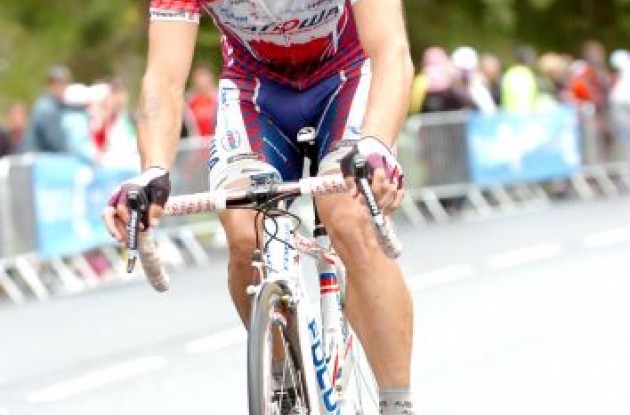Alexandr Kolobnev Fails Tour de France Doping Test
Russia's Alexandr Kolobnev became the first cyclist at this year's Tour de France to fail a doping test, the International Cycling Union (UCI) announced in a statement earlier today.
Russia's Alexandr Kolobnev became the first cyclist at this year's Tour de France to fail a doping test, the International Cycling Union (UCI) announced in a statement earlier today.
Kolobnev was in 69th place heading into Tuesday's 10th stage after today's first rest day of the Tour de France.
The UCI said a urine sample collected from Kolobnev last Wednesday tested positive for hydrochlorothiazide, a diuretic that can also be used as a masking agent hiding the presence of other drugs. The samples were analyzed at the Chatenay-Malabry laboratory, which is accredited by the World Anti-Doping Agency (WADA).
The test was conducted on the day of the fifth stage of the 2011 Tour de France - a flat sprint stage from Carhaix to Cap Frehel.
Tour organizer A.S.O. and French Anti-Doping Agency President Bruno Genevois did not make any immediate comment.
Kolobnev, who rides for the Katusha team, has four days to request an analysis of his "B" sample if he so pleases.
When asked whether Kolobnev would stay in the race, Katusha sports director Bart Leysen said "I don't think so."
The 30-year-old rider left the hotel with officers to go to the police station where he was due for questioning, saying they "just want to check some things with him, papers, and normally they will bring him back later."
The UCI can't provisionally ban Kolobnev because hydrochlorothiazide is classified as a specified substance, which WADA defines as one that is "more susceptible to a credible, non-doping explanation." Its punishment for such a positive test ranges from a warning to a two-year ban.
However, the statement released by the UCI earlier today included the following paragraph.
"However the UCI is confident that his team will take the necessary steps to enable the Tour de France to continue in serenity and to ensure that their rider has the opportunity to properly prepare his defense in particular within the legal timeline, which allows four days for him to have his B sample analyzed."
Some pro cycling analysts, however, find that the exclusion of the rider from the Tour will harm his defense more than what would have been the case if he had been allowed to continue in the race until the B-sample had been tested.
Additionally, some analysts question if four days is a fair period of time to give a cyclist to assemble a defense team and identify and hire a team of experts to monitor how the B-sample is tested.
The public has a habit of considering any cyclist, who is excluded from a race because of suspicion of the use of illegal substances, guilty of such a crime.
Cycling's showcase race has been devastated by doping scandals over the years. Tougher new measures seemed to have produced fewer doping cases until defending champion Alberto Contador tested non-negative for the banned anabolic agent clenbuterol in last year's Tour de France. The overall number of non-negative test results has, however, dropped significantly in the Tour in recent years.








